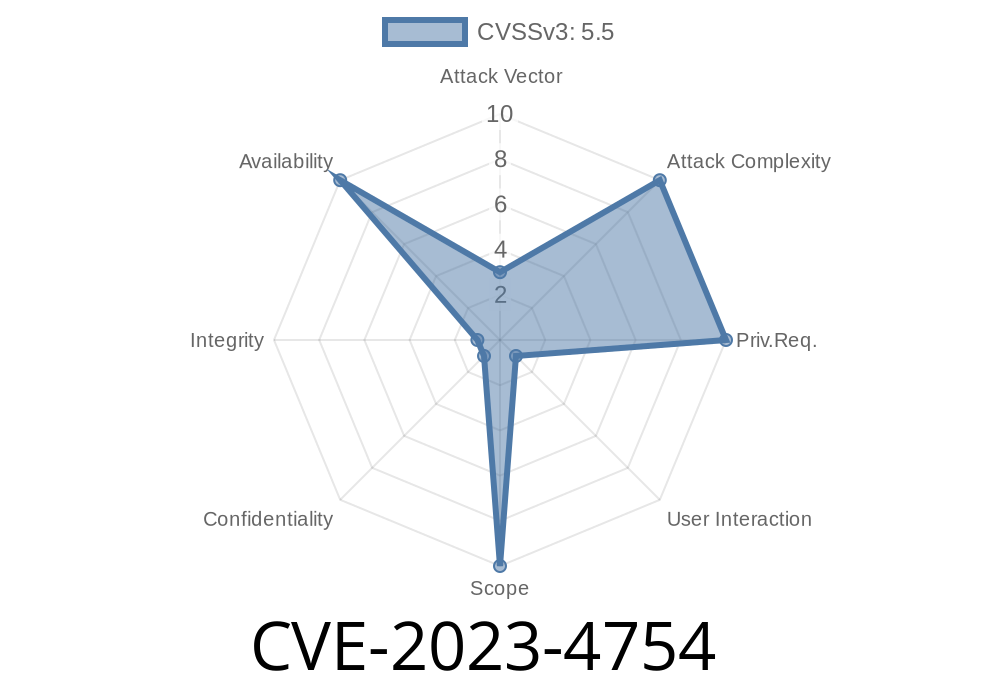In the world of multimedia frameworks, GPAC (General Purpose Audio/Video Codec) is a widely used open-source project. But in 2023, a nasty vulnerability known as CVE-2023-4754 was discovered. This bug allows an attacker to perform an out-of-bounds write, which is a dangerous kind of memory error that can lead to application crashes or even remote code execution. Here, I'll break down what this vulnerability is, how it happens, and provide example code snippets and references for further investigation.
Background: What is GPAC?
GPAC is a popular multimedia framework used for manipulating and streaming video and audio. It is widely used both as a command-line toolkit and as a set of libraries in multimedia software.
What's an Out-of-Bounds Write?
An out-of-bounds write happens when a program writes data past the end (or before the beginning) of a memory buffer. It can overwrite important data, crash the app, or pave the way for attackers to run malicious code.
The CVE-2023-4754 Bug
Vulnerability: Out-of-bounds write in GPAC/gpac before version 2.3-DEV.
CVE Reference: CVE-2023-4754
GitHub Issue & Patch:
- Security Patch: gpac/gpac#2614
- Commit Fix: gpac/gpac commit ce7b9a1
How it Happens
The vulnerability exists in the way GPAC handled certain media files. If an attacker can craft a specifically malformed file (like an MP4), GPAC may write data outside the allocated buffer when parsing that file, leading to corruption of memory and possible code execution.
Affected Versions:
All GPAC 2.x versions prior to 2.3-DEV.
Technical Details – Code Vulnerability
An out-of-bounds write typically occurs because of missing checks around memory allocation or buffer indexing. Here's a simplified example (not the real code, but similar):
// Suppose 'buf' has a size of 256 bytes
char buf[256];
// Attacker provides 'index', but no check is performed!
int index = get_index_from_file(file);
// This can overwrite memory if index >= 256!
buf[index] = x41;
If index is supplied from untrusted input (like a media file), nothing prevents an attacker from choosing a bad value. That's how an out-of-bounds write can occur.
In the real CVE-2023-4754 bug, the GPAC parser would sometimes trust file-supplied values and perform writes that went past allocated buffers.
Example Proof-of-Concept (PoC) Exploit
For demonstration, here's a conceptual PoC. This shows how a specially crafted file might crash (or exploit) GPAC:
1. Create a Malicious MP4 File
Attackers often fuzz file parsers to find bugs. Tools like AFL or zzuf can generate problematic files.
# Fuzz the MP4 parser with AFL
afl-fuzz -i /path/to/valid/mp4/files -o ./outputs gpac -i @@
Once you have a crashing file, running
# This may crash or exploit older GPAC versions (< 2.3-DEV)
gpac -i malicious_file.mp4
could demonstrate the out-of-bounds write.
Note: No pre-built malicious file is provided for safety reasons.
The Actual Fix
Looking at the patch, the developers added proper checks before writing into buffers, making sure file-supplied values are validated.
- my_buffer[attacker_index] = value;
+ if (attacker_index < buffer_size) {
+ my_buffer[attacker_index] = value;
+ }
More Reading & References
- CVE-2023-4754 NVD Details
- GPAC GitHub Repository
- GitHub Issue #2614
- Common Exploits: Out-of-Bounds Write
Conclusion
CVE-2023-4754 is a serious bug that could crash software or let bad actors run code on your system just by processing an evil media file. The GPAC team fixed it fast, but everyone updating is key to staying safe. If you maintain a system with GPAC, check your install and update promptly. File parser bugs like this are easy to trigger but hard to detect—stay safe, update early, and never trust media files from strangers!
Exclusive tip: Use AddressSanitizer or fuzzing tools to test your own builds of multimedia software for hidden vulnerabilities.
*If you’ve got additional questions about this bug, ping me in the comments or check out the links above.*
Timeline
Published on: 09/04/2023 09:15:00 UTC
Last modified on: 09/06/2023 22:23:00 UTC
